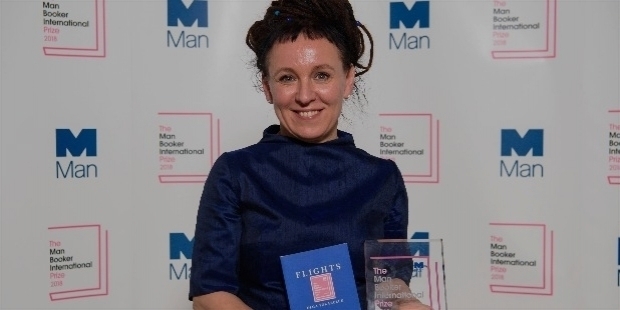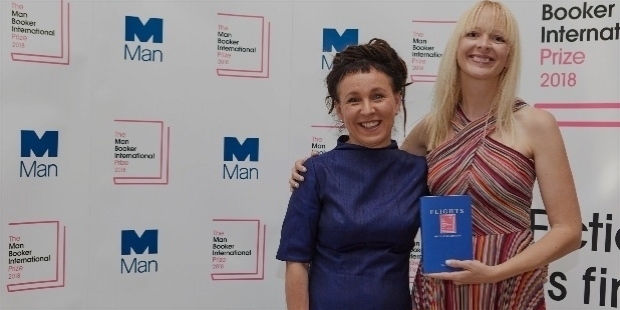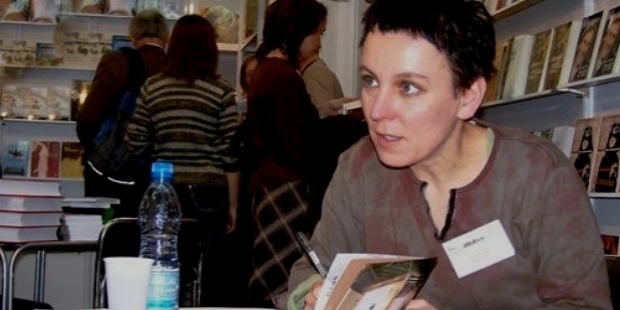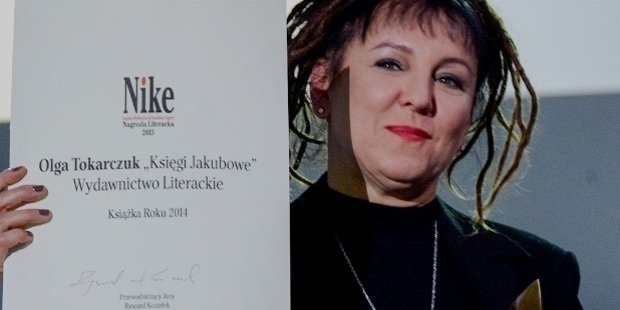Olga Tokarczuk - Man Booker International Prize Winner

Renowned Polish writer Olga Tokarczuk won the literary most prestigious honour – the 2018 Man Booker International Prize for her novel ‘Flights’. Lisa Appignanesi OBE, the Chair of the judging panel of the 2018 Man Booker International Prize showered her praise, “Tokarczuk is a writer of wonderful wit, imagination and literary panache. In ‘Flights’, Ms. Tokarczuk flies us through a galaxy of departures and arrivals, stories and digressions, all the while, exploring matters close to the contemporary and human predicament — where only plastic escapes mortality.”

‘Flights’ is a philosophical rumination on modern-day travel. Olga Tokarczuk will share the prize of £50,000 with Jennifer Croft, the book’s English translator. The Man Booker Prize is one of the most prestigious literary awards not only in the British Culture, but also renowned worldwide in the literary world. Each year, the award is conferred to the ‘Best Original Novel Written in English Language and Published in the UK’.
The organization, which awards the Man Booker Prize for fiction, also awards the Man Booker International Prize. In 2018, the award was opened to Irish publishers as well. Started way back in 1969, P H Newby became the first writer to win the prestigious award, for his novel ‘Something to answer for’.
Olga Tokarczuk’s original Polish novel ‘Bieguni’, published in 2008, was translated by Jennifer Croft and titled ‘Flights’ in English. ‘Flights’ narrates tales of travelling, mobility and movement and makes them a metaphor for life itself. The renowned Polish writer plays around with, what readers understand as a conventional form of a novel.

Olga throws in several, disparate narratives, like tracing the posthumous journey of Polish Composer Chopin’s heart to Warsaw from Paris, where he had died; or anatomist Philip Verheyen writing letters to his amputated leg and then interlaces them with short bursts of digressions, anecdotes and analysis. ‘Flights’ is the third book by Olga Tokarczuk, which has been translated in English.
In 2008, Olga had won Poland’s highest literary award – the Nike Literary Award for ‘Bieguni (Flights)’. Nagroda Literacka Nike – The Nike Literary Award is one of the most prestigious awards for Polish literature. The award was established in 1997 and funded by Gazeta Wyborcza and the consulting company NICOM. The award is conferred annually for the best book of a single living author, writing in Polish, published the previous year.
Seven years later, Olga’s ‘Ksiegi Jakubowe’ – ‘The Books of Jacobs’ won the 2015 Nike Literary Award. The novel was about the 18th Century Polish-Jewish religious leader Jacob Frank.
Early Life
Olga Tokarczuk was born on the 29th of January 1962 in Sulechów, Poland. Young Olga was trained as a psychologist, at the University of Warsaw from 1980. She completed her graduation in 1985. She moved to Wroclaw and later to Walbrzych. She commenced her practice as a therapist.

A hardcore disciple of Carl Jung, Olga was inspired by his psychology to turn towards the literary world. Olga lives in a small village, near Nowa Ruda since 1998. She owns and manages RUTA, her private publishing company. Olga is a member of the political party – The Greens (Poland). She believes strongly in leftist convictions.
The Journey of Success
Olga Tokarczuk made her debut as a poet in 1989, with ‘Miasta W Lustrach’ – ‘Cities in Mirrors’, a collection of poems. She made her debut as a writer with ‘Podróz Ludzi Ksiegi’ – ‘The Journey of the Book-People’, a novel in 1993. The novel narrates about a parable on two lovers' quest for the ‘Secret of the Book’ – a metaphor for the meaning of life. The novel was set in the 17th Century France. The novel gained instant popularity for Olga.

In 1996, the writer published the novel, titled E.E. The novel is about a young woman, named Erna Eltzner, who grows up in a bourgeois German-Polish family in Breslau in the 1920s. She develops psychic abilities. Breslau is the German city, which became the Polish Wroclaw, after the World War II.
Olga’s third novel ‘Prawiek I Inne Czasy’ – ‘Primeval and Other Times’ became very popular in 1996. The fiction was set in the fictitious village of Prawiek – Primeval, at the very heart of Poland. The village is populated by some eccentric, archetypical characters. The novel chronicles the four archangels’, guarding the village, perspective of the lives of Prawiek's inhabitants, over a period of eight decades, beginning in 1914.
The novel describes the continuum of all human joys and pains. Olga’s novel was translated in many languages. In 2009, ‘Prawiek I Inne Czasy’ was translated in English by Antonia Lloyd-Jones as ‘Primeval and Other Times’. The novel established Olga’s reputation in the world, as one of the most important representatives of Polish Literature, in her generation.
Olga experimented with shorter prose texts and essays. In 1998, Olga wrote ‘Dom Dzienny, Dom Nocny’ – ‘House of Day, House of Night’. This was her first book, which was translated in English by Antonia Lloyd-Jones in 2003 for Northwestern University Press. The novel was a patchwork of loosely connected disparate stories, sketches and essays about life’s past and present in the author's adopted home, a village in Krajanów in the Sudetes near the Polish-Czech border.
In 2000, Olga wrote ‘Opowiesci Wigilijne’ – ‘Christmas Tales’ with Jerzy Pilch and Andrzej Stasiuk, her fellow writers. She also wrote ‘Lalka I Perla’ – ‘The Doll and the Pearl’ a non-fiction essay on the subject of Boleslaw Prus' classic novel ‘The Doll’ in 2000. 2001 saw Olga coming out with another collection of short stories ‘Gra Na Wielu Bebenkach’ – ‘Playing on many Drums’.

‘Ostatnie Historie’ – ‘The Last Stories’ was released in 2004. The novel captures an exploration of death, from the perspectives of three generations. In 2006, Olga came out with ‘Anna w Grobowcach Swiata’ – ‘Anna in the Tombs of the World’. The novel was a contribution to the Canongate Myth Series by Polish publisher Znak.
In 2007, Olga released ‘Bieguni’ – ‘Flights’. She returned to the patchwork approach of essay and fiction. The major theme is about modern day nomads. The huge success of the novel won Olga the ‘Readers’ Prize’ and the ‘Jury Prize’ at the 2008 Nike Literary Award.
In 2009, Olga’s ‘Prowadz Swój Plug Przez Kosci Umarlych’ – ‘Drive Your Plow over the Bones of the Dead’ was released. The compelling novel was written in the convention of a detective story with the main character telling the story from her point of view. The novel posed questions about the responsibility of human beings, towards nature and the dangers of them having a personal mythology.
In 2012, Olga came out with ‘Moment Niedzwiedzia’ – ‘The Moment of the Bear’, followed by ‘Ksiegi Jakubowe’ – ‘Jacob's Scriptures’ in 2014. Olga Tokarczuk has won numerous literary awards, both, in and outside Poland. Olga was awarded Vilenica Prize in 2013.
Olga Tokarczuk won the 2015 Nike Literary Award for her epic novel ‘Ksiegi Jakubowe’ – ‘Jacob's Scriptures’. The novel with its historical setting of the 18th Century Poland and eastern-central Europe deals with an important episode in the Jewish history. The book was characterized as anti-Sienkiewicz, in regards to the historical and ideological divides of Polish literature. However, the novel was acclaimed by critics and readers. The hostile reception in some Polish nationalistic circles made Olga Tokarczuk, a target of an internet hate and harassment campaign.

In 2015, Olga was the proud recipient of the 2015 Brückepreis – the ‘German-Polish International Bridge Prize’, the 20th Edition of the award, granted by the Europa-City Zgorzelec/Görlitz. The prize is a joint undertaking of the German and Polish border twin cities. The aim of the prize is to consolidate advancing mutual, regional and European peace, understanding and cooperation among people of different nationalities, cultures and viewpoints.
Olga Tokarczuk's creation of literary bridges connecting people, generations and cultures, especially residents of the border territories of Poland, Germany and the Czech Republic, who have had often different existential and historical experiences was highly appreciated by the jury. The jury also stressed Tokarczuk's rediscovery and elucidation of the complex multinational and multicultural past of the Lower Silesia region, an area of great political conflicts.
Olga attended the award ceremony in Görlitz. She was impressed by the positive and pragmatic attitude, demonstrated by the Mayor of the German town, in regards to the current refugee and migrant crisis, which she contrasted with the ideological uproar surrounding the issue in Poland.
The First Polish Writer
Olga Tokarczuk became the first ever Polish writer to win the Man Booker International Prize for her beloved country Poland. She is renowned for the hallmark mythical tone of her writing. Olga Tokarczuk may be a controversial figure in her home country, because of being an activist and vocal critic of Poland’s rightwing politics. However, she has made Polish Literature History rich with her impeccable writings.










